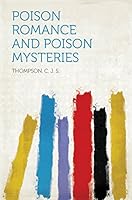Description
C. J. S. Thompson's Poison Romance and Poison Mysteries offers a scholarly yet deeply captivating exploration of one of humanity's most enduring fascinations: the history, mythology, and cultural significance of poison. Rather than limiting itself to a clinical study of chemical compounds or toxicological science, this work ventures into the realms of legend, literature, superstition, and historical record. The result is a sweeping account that blends scientific curiosity with narrative richness, shedding light on how poison has shaped imagination, law, and even the political fortunes of nations.From antiquity to the modern era, poison has occupied a unique place in human thought. In ancient civilizations, it was both feared and revered, woven into rituals, remedies, and acts of intrigue. Classical writers described its use in myth and medicine, while medieval chronicles gave it a more sinister reputation, associating it with treachery, sorcery, and moral corruption. Thompson carefully reconstructs these shifting perceptions, tracing how different cultures viewed poison as both an instrument of power and a symbol of hidden danger.What distinguishes this study is the author's ability to balance erudition with storytelling. Thompson does not merely list cases of poisoning but examines the psychological and cultural frameworks that surrounded them. The text explores the legendary role of poison in courts and palaces, the anxieties it inspired among monarchs, and its shadowy presence in some of the most dramatic episodes of European history. At the same time, it considers how poison became embedded in folklore, creating enduring archetypes of the secretive assassin, the cunning poisoner, and the doomed victim.The work also delves into the literary imagination. Across centuries, dramatists, poets, and novelists employed poison as both a metaphor and a plot device. Whether representing fate, revenge, passion, or hidden corruption, the motif of poisoning has provided writers with a means of intensifying drama and revealing the darker sides of human character. Thompson highlights these recurring patterns, illustrating how literature and cultural narrative amplified the aura of mystery surrounding poisons.Beyond stories and superstitions, the book addresses the evolution of toxicology and the gradual disentangling of myth from science. As medical knowledge advanced, so too did understanding of the substances that once inspired terror. Yet even as poisons became more thoroughly studied, their association with secrecy and danger continued to exert influence in both popular and intellectual thought. Thompson examines this paradox, offering readers a layered interpretation of poison's place in society.In presenting this material, the book achieves a rare synthesis: it is both a reference for the historian of science and culture and a work that appeals to the general reader who is fascinated by the mysteries of the past. Its scholarly grounding ensures accuracy and depth, while its style and breadth of examples make it engaging and accessible. The narrative moves seamlessly between eras and disciplines, illuminating how a single theme—poison—can reveal so much about human fear, imagination, and ambition.


 Amazon UK
Amazon UK